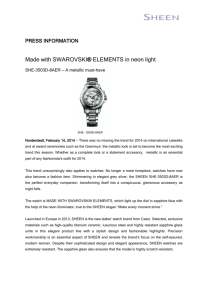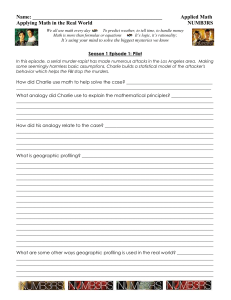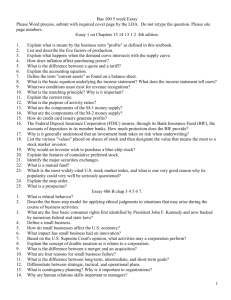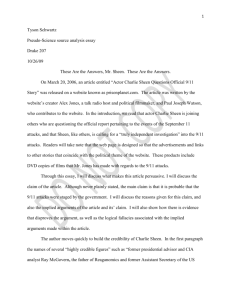Point by Point Method for Comparison or Contrast Essay
advertisement
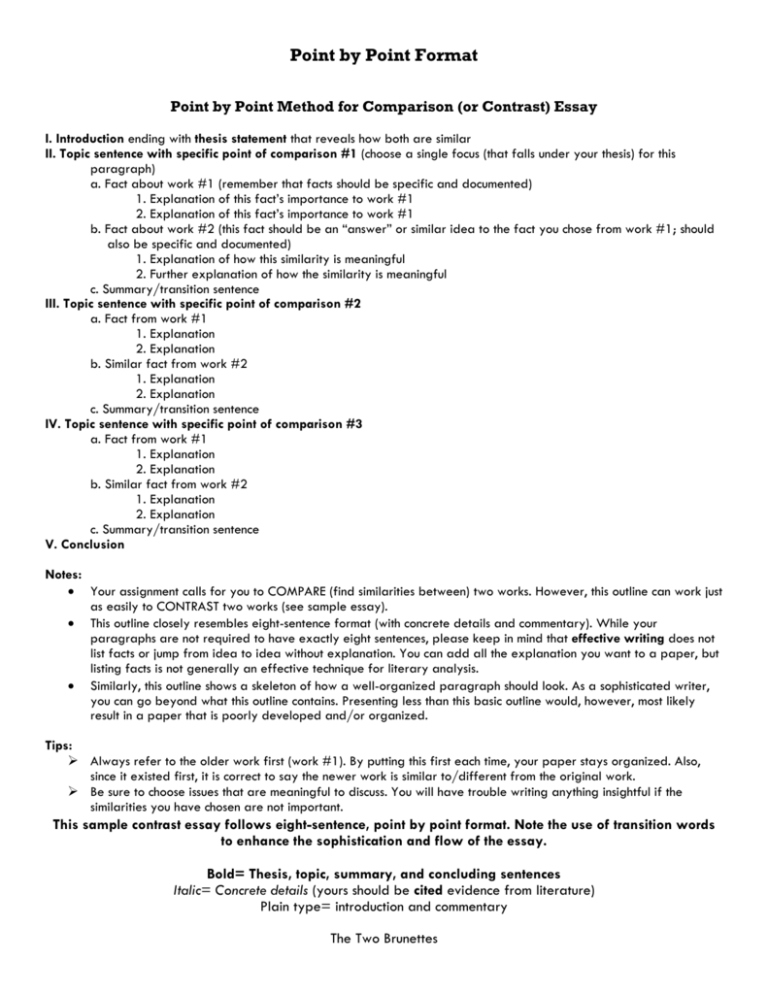
Point by Point Format Point by Point Method for Comparison (or Contrast) Essay I. Introduction ending with thesis statement that reveals how both are similar II. Topic sentence with specific point of comparison #1 (choose a single focus (that falls under your thesis) for this paragraph) a. Fact about work #1 (remember that facts should be specific and documented) 1. Explanation of this fact’s importance to work #1 2. Explanation of this fact’s importance to work #1 b. Fact about work #2 (this fact should be an “answer” or similar idea to the fact you chose from work #1; should also be specific and documented) 1. Explanation of how this similarity is meaningful 2. Further explanation of how the similarity is meaningful c. Summary/transition sentence III. Topic sentence with specific point of comparison #2 a. Fact from work #1 1. Explanation 2. Explanation b. Similar fact from work #2 1. Explanation 2. Explanation c. Summary/transition sentence IV. Topic sentence with specific point of comparison #3 a. Fact from work #1 1. Explanation 2. Explanation b. Similar fact from work #2 1. Explanation 2. Explanation c. Summary/transition sentence V. Conclusion Notes: Your assignment calls for you to COMPARE (find similarities between) two works. However, this outline can work just as easily to CONTRAST two works (see sample essay). This outline closely resembles eight-sentence format (with concrete details and commentary). While your paragraphs are not required to have exactly eight sentences, please keep in mind that effective writing does not list facts or jump from idea to idea without explanation. You can add all the explanation you want to a paper, but listing facts is not generally an effective technique for literary analysis. Similarly, this outline shows a skeleton of how a well-organized paragraph should look. As a sophisticated writer, you can go beyond what this outline contains. Presenting less than this basic outline would, however, most likely result in a paper that is poorly developed and/or organized. Tips: Always refer to the older work first (work #1). By putting this first each time, your paper stays organized. Also, since it existed first, it is correct to say the newer work is similar to/different from the original work. Be sure to choose issues that are meaningful to discuss. You will have trouble writing anything insightful if the similarities you have chosen are not important. This sample contrast essay follows eight-sentence, point by point format. Note the use of transition words to enhance the sophistication and flow of the essay. Bold= Thesis, topic, summary, and concluding sentences Italic= Concrete details (yours should be cited evidence from literature) Plain type= introduction and commentary The Two Brunettes On the surface, Steve Carell and Charlie Sheen seem quite similar. Both men said goodbye to their twenties long ago. Both men have dark hair. Both are actors who starred on hit prime-time comedies. However, despite these similarities, the two actors are actually quite dissimilar. In truth, Steve Carell is significantly different from Charlie Sheen. Clearly, one way the gentlemen differ is in their career trajectories. Charlie Sheen has been in show business for many years, and is the son of another accomplished actor, Martin Sheen. His long career is important to his identity because it adds to his viewers' attitudes about his parts. His family's involvement in show business helped him stay in the business over the years and has helped him get roles based on his reputation and name recognition. Steve Carell, on the other hand, has only recently become famous. The difference between the two is clear and meaningful; Steve Carell has not had the long career in the spotlight, so the audience's perception of him is different. Also, Carell could not use his famous name to get roles or attention, and had to work his way up to get parts, unlike Sheen, whose famous name undoubtedly helped him get parts. Hence, a meaningful difference between these actors is how their career paths have differed. Additionally, the roles they have played in the past are quite different. Charlie Sheen regularly plays rebellious, wisecracking womanizers. His characters are memorable for their outrageous behavior. Watching a movie or a show he is in is often an exercise in putting aside actual feelings and accepting and rooting for a character who would, in real life, seem fairly objectionable. On the other side of the spectrum, Steve Carell's former roles have been kind, awkward characters who inspire sympathy in the viewer. The difference between these roles could scarcely be more different: the innocence of Dan from Dan in Real Life and Horton from Horton Hears a Who could not contrast more with Ricky Vaughn from Major League or Bud Fox from Wall Street. An actor is correctly defined through the roles he has chosen to play, and the roles they have played show a major difference between the two of them. Clearly, their past roles show that they are different. Ultimately, their most recent television roles also display the disparity between the two actors. Sheen starred as Charlie Harper on Two and a Half Men; Charlie is an irresponsible womanizer who revels in his own hijinks. Charlie Harper is Charlie Harper's number one fan, but audiences find him endearing because of the wink-wink-nudge-nudge aspect of Sheen's portrayal. The audience is practically in on an inside joke that Charlie Sheen is making money playing himself. The self-awareness of the character and his lack of apology for his behavior mimics Sheen's own persona. In contrast stands Steve Carell's Michael Scott. While part of Charlie Harper's charm is his self-awareness, part of Michael Scott's charm is his utter obliviousness. While Harper is a smooth operator, Scott is a buffoon who doesn't realize what he is. While Harper is dealing with the problem of having too many beautiful women chasing after him, Scott is falling into a koi pond in an office lobby. Sheen embodies machismo and confidence; Carell conveys pathos and awkwardness. Truly, the differences between the characters they currently play highlight the difference between the actors. Obviously, Sheen and Carell have their differences. However, what we choose to focus on is entirely in our own hands (or in the hands of the person assigning a paper). In the big picture, two actors with graying hair and enough royalties to live out life on top of a pile of cash are probably similar enough to be the subjects of a comparison rather than contrast paper. Actually, the importance of this topic most likely does not warrant an essay, but as an example of how to use point-by-point method, this paper has served its purpose.

